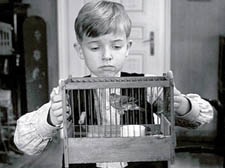|
|
 |
| |

The White Ribbon portrays events in a German village in the months before the First World War |
An outbreak of bizarre events on road to war
THE WHITE RIBBON
Directed by Michael Haneke
Certificate 15
THIS is a masterpiece of film-making – a haunting, brilliant piece of storytelling, well shot, jammed with performances that connect you to the characters, and with a feel about it that will linger long after the closing credits.
Narrated by a school teacher, Ernst Jacobi (Christian Friedel), the story focuses on a series of strange and apparently random events in a small German village in the months before the outbreak of the First World War.
As we enter the village, days seem to be trundling along in a kind of gentle rural way, the seasons dominating the rhythm of life. We meet the Baron, a doctor, a pastor and a school teacher, and various other characters whose lives are intertwined.
But then things start to happen. The doctor has a horse riding accident, caused by a piece of wire strung between two trees. Then a farmer’s wife dies after falling through rotten floorboards in a saw mill.
Other events cast a shadow across the village. A barn is torched, a window of a nursery is opened, exposing a newborn to the bitter winter winds. A field of cabbages in vandalised.
A boy is kidnapped and found bound and whipped in the forest, a bird is killed with a letter opener.
There is something dark and malignant afoot, but what it is, no one knows. These events seem at first to be unconnected. Then our school teacher begins to investigate, and what transpires is a haunting and at times shocking film.
Michael Haneke has created a story that feels real – there is no setpiece beginning, middle or end, just a story told with the benefit of hindsight, by the teacher who is looking backwards: it gives it the feel of Ernst sitting across a hearth from the viewer, rocking back and forth in an armchair as the village’s secrets are uncovered.
The White Ribbon has many components that come together. It feels like a parable – the events played out and the people behind them cleverly mimics the behaviour of the European powers in the build up to war.
This is a genuine, stand-out film of 2009, and cements Haneke’s reputation as one of Europe’s pre-eminent directors working today. |
 |
|
 |
| |
|
 |
|

